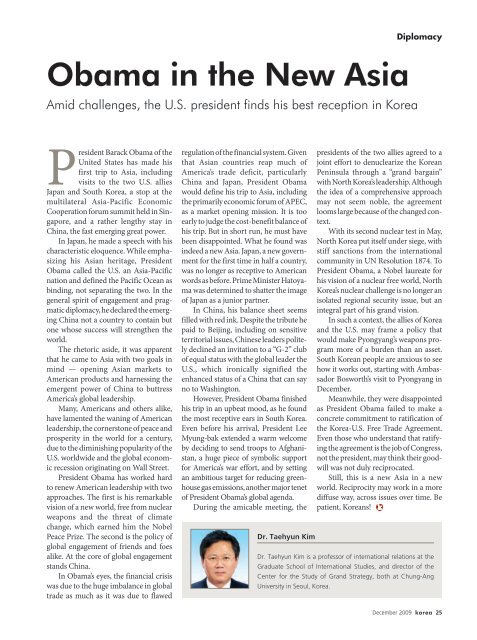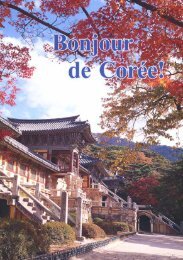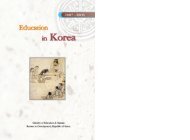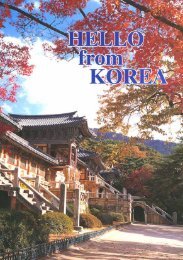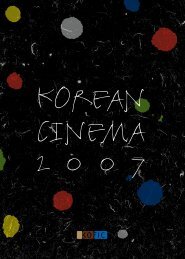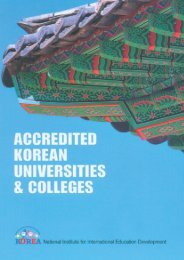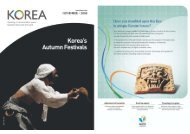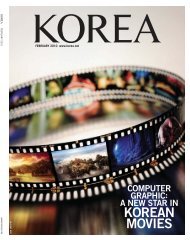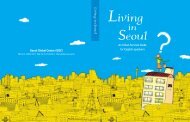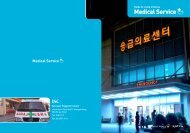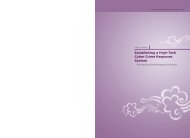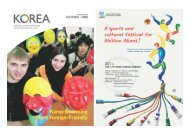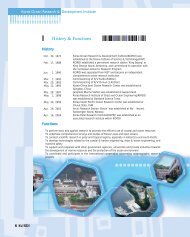2005-2162
12 Innovative Success Stories - Korea.net
12 Innovative Success Stories - Korea.net
- No tags were found...
You also want an ePaper? Increase the reach of your titles
YUMPU automatically turns print PDFs into web optimized ePapers that Google loves.
Obama in the New Asia<br />
Amid challenges, the U.S. president finds his best reception in Korea<br />
Diplomacy<br />
President Barack Obama of the<br />
United States has made his<br />
first trip to Asia, including<br />
visits to the two U.S. allies<br />
Japan and South Korea, a stop at the<br />
multilateral Asia-Pacific Economic<br />
Cooperation forum summit held in Singapore,<br />
and a rather lengthy stay in<br />
China, the fast emerging great power.<br />
In Japan, he made a speech with his<br />
characteristic eloquence. While emphasizing<br />
his Asian heritage, President<br />
Obama called the U.S. an Asia-Pacific<br />
nation and defined the Pacific Ocean as<br />
binding, not separating the two. In the<br />
general spirit of engagement and pragmatic<br />
diplomacy, he declared the emerging<br />
China not a country to contain but<br />
one whose success will strengthen the<br />
world.<br />
The rhetoric aside, it was apparent<br />
that he came to Asia with two goals in<br />
mind — opening Asian markets to<br />
American products and harnessing the<br />
emergent power of China to buttress<br />
America’s global leadership.<br />
Many, Americans and others alike,<br />
have lamented the waning of American<br />
leadership, the cornerstone of peace and<br />
prosperity in the world for a century,<br />
due to the diminishing popularity of the<br />
U.S. worldwide and the global economic<br />
recession originating on Wall Street.<br />
President Obama has worked hard<br />
to renew American leadership with two<br />
approaches. The first is his remarkable<br />
vision of a new world, free from nuclear<br />
weapons and the threat of climate<br />
change, which earned him the Nobel<br />
Peace Prize. The second is the policy of<br />
global engagement of friends and foes<br />
alike. At the core of global engagement<br />
stands China.<br />
In Obama’s eyes, the financial crisis<br />
was due to the huge imbalance in global<br />
trade as much as it was due to flawed<br />
regulation of the financial system. Given<br />
that Asian countries reap much of<br />
America’s trade deficit, particularly<br />
China and Japan, President Obama<br />
would define his trip to Asia, including<br />
the primarily economic forum of APEC,<br />
as a market opening mission. It is too<br />
early to judge the cost-benefit balance of<br />
his trip. But in short run, he must have<br />
been disappointed. What he found was<br />
indeed a new Asia. Japan, a new government<br />
for the first time in half a country,<br />
was no longer as receptive to American<br />
words as before. Prime Minister Hatoyama<br />
was determined to shatter the image<br />
of Japan as a junior partner.<br />
In China, his balance sheet seems<br />
filled with red ink. Despite the tribute he<br />
paid to Beijing, including on sensitive<br />
territorial issues, Chinese leaders politely<br />
declined an invitation to a “G-2” club<br />
of equal status with the global leader the<br />
U.S., which ironically signified the<br />
enhanced status of a China that can say<br />
no to Washington.<br />
However, President Obama finished<br />
his trip in an upbeat mood, as he found<br />
the most receptive ears in South Korea.<br />
Even before his arrival, President Lee<br />
Myung-bak extended a warm welcome<br />
by deciding to send troops to Afghanistan,<br />
a huge piece of symbolic support<br />
for America’s war effort, and by setting<br />
an ambitious target for reducing greenhouse<br />
gas emissions, another major tenet<br />
of President Obama’s global agenda.<br />
During the amicable meeting, the<br />
Dr. Taehyun Kim<br />
presidents of the two allies agreed to a<br />
joint effort to denuclearize the Korean<br />
Peninsula through a “grand bargain”<br />
with North Korea’s leadership. Although<br />
the idea of a comprehensive approach<br />
may not seem noble, the agreement<br />
looms large because of the changed context.<br />
With its second nuclear test in May,<br />
North Korea put itself under siege, with<br />
stiff sanctions from the international<br />
community in UN Resolution 1874. To<br />
President Obama, a Nobel laureate for<br />
his vision of a nuclear free world, North<br />
Korea’s nuclear challenge is no longer an<br />
isolated regional security issue, but an<br />
integral part of his grand vision.<br />
In such a context, the allies of Korea<br />
and the U.S. may frame a policy that<br />
would make Pyongyang’s weapons program<br />
more of a burden than an asset.<br />
South Korean people are anxious to see<br />
how it works out, starting with Ambassador<br />
Bosworth’s visit to Pyongyang in<br />
December.<br />
Meanwhile, they were disappointed<br />
as President Obama failed to make a<br />
concrete commitment to ratification of<br />
the Korea-U.S. Free Trade Agreement.<br />
Even those who understand that ratifying<br />
the agreement is the job of Congress,<br />
not the president, may think their goodwill<br />
was not duly reciprocated.<br />
Still, this is a new Asia in a new<br />
world. Reciprocity may work in a more<br />
diffuse way, across issues over time. Be<br />
patient, Koreans! <br />
Dr. Taehyun Kim is a professor of international relations at the<br />
Graduate School of International Studies, and director of the<br />
Center for the Study of Grand Strategy, both at Chung-Ang<br />
University in Seoul, Korea.<br />
December 2009 korea 25


